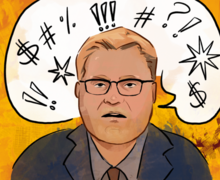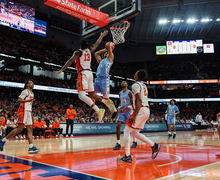Q&A with Keller Williams: Funk-, bluegrass-inspired singer-songwriter
Drawing influence from genres like folk, reggae, funk, bluegrass and alternative rock, Keller Williams is constantly stirring up his own styles of music. On stage, it’s just Williams, a microphone, his acoustic guitar and a loop pedal — and it’s all coming to the Westcott Theater on Friday.
Hailing from Fredericksburg, Va., Williams has released 19 studio, live and cover albums. His autumn tour will include solo performances, as well as several collaborations with bands like More Than A Little. He is also anticipating the release of a new album, aptly titled “Funk,” on Nov. 12.
The Daily Orange spoke with Williams to discuss his music style and inspiration before he hits the Westcott stage this weekend. General admission tickets for the show are $25.
The Daily Orange: How did you first get into performing music, and what inspired you to do it for a living?
Keller Williams: I always pretended as a little kid to play and sing, and you know, always been a huge music fan. I guess the real reason I started doing it all the time was that I was able to make about as much in a couple hours sitting on a stool playing cover songs than I was pushing a wheelbarrow around in the summer with a hardhat and boots. It seemed like the obvious choice. It was more fun, and it was what I wanted to do, and I just kind of … went from there.
The D.O.: How would you describe your current music style, and how has your music changed since the 1990s?
Williams: I have definitely accepted more of a dance vibe than I did in the ’90s. The short answer: I would describe my music to be acoustic dance music, and dance music has many different meanings all over the world. In Europe, dance music is kind of like a club thing, and I think that’s what the universal term has become for dance music. But my flavor is more acoustic, and every song has a backbeat of its own kind that is able to dance to, so that’s what I like to call it.
The D.O.: How did you discover the loop pedal as an aid for your live performances?
Williams: The idea around the mid-’90s was to play music with humans and be in bands. I came to the point where I wasn’t able to afford bands, but I still wanted to create that type of live, dance music type of thing, so the looping thing really helped me go there organically by creating the samples live in front of an audience without any prerecorded samples. It gave me a lot of musical avenues to go down, and once it started working, I kept it going.
The D.O.: What is it like to constantly improvise on stage?
Williams: There’s a massive amount of freedom that’s involved, especially with being solo. The improvising as a solo act is intriguing. Improvising is like having a conversation between folks musically, and if you’re not listening, then you don’t have anything to add. As a solo act, I pretty much have to clear my mind and make something up right there with the first loop, and that’s where the improvisation starts. Then I can lay down a bass line, and I have to figure out what kind of drumbeat to use.
Published on September 12, 2013 at 1:20 am
Contact Anna: almerod@syr.edu





